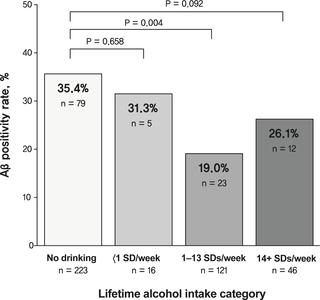Our official English website, www.x-mol.net, welcomes your feedback! (Note: you will need to create a separate account there.)
Association of moderate alcohol intake with in vivo amyloid-beta deposition in human brain: A cross-sectional study.
PLOS Medicine ( IF 15.8 ) Pub Date : 2020-02-25 , DOI: 10.1371/journal.pmed.1003022 Jee Wook Kim 1, 2 , Min Soo Byun 3 , Dahyun Yi 3 , Jun Ho Lee 4 , Kang Ko 5 , So Yeon Jeon 6 , Bo Kyung Sohn 7 , Jun-Young Lee 8, 9 , Yu Kyeong Kim 10 , Seong A Shin 10 , Chul-Ho Sohn 11 , Dong Young Lee 3, 4, 9 ,
PLOS Medicine ( IF 15.8 ) Pub Date : 2020-02-25 , DOI: 10.1371/journal.pmed.1003022 Jee Wook Kim 1, 2 , Min Soo Byun 3 , Dahyun Yi 3 , Jun Ho Lee 4 , Kang Ko 5 , So Yeon Jeon 6 , Bo Kyung Sohn 7 , Jun-Young Lee 8, 9 , Yu Kyeong Kim 10 , Seong A Shin 10 , Chul-Ho Sohn 11 , Dong Young Lee 3, 4, 9 ,
Affiliation

|
BACKGROUND
An emerging body of literature has indicated that moderate alcohol intake may be protective against Alzheimer disease (AD) dementia. However, little information is available regarding whether moderate alcohol intake is related to reductions in amyloid-beta (Aβ) deposition, or is protective via amyloid-independent mechanisms in the living human brain. Here we examined the associations of moderate alcohol intake with in vivo AD pathologies, including cerebral Aβ deposition, neurodegeneration of AD-signature regions, and cerebral white matter hyperintensities (WMHs) in the living human brain.
METHODS AND FINDINGS
The present study was part of the Korean Brain Aging Study for Early Diagnosis and Prediction of Alzheimer's Disease (KBASE), an ongoing prospective cohort study that started in 2014. As of November 2016, 414 community-dwelling individuals with neither dementia nor alcohol-related disorders (280 cognitively normal [CN] individuals and 134 individuals with mild cognitive impairment [MCI]) between 56 and 90 years of age (mean age 70.9 years ± standard deviation 7.8; male, n [%] = 180 [43.5]) were recruited from 4 sites (i.e., 2 university hospitals and 2 public centers for dementia prevention and management) around Seoul, South Korea. All the participants underwent comprehensive clinical assessments comprising lifetime and current histories of alcohol intake and multimodal brain imaging, including [11C] Pittsburgh compound B positron emission tomography (PET), [18F] fluorodeoxyglucose (FDG) PET, and magnetic resonance imaging (MRI) scans. Lifetime and current alcohol intake were categorized as follows: no drinking, <1 standard drink (SD)/week, 1-13 SDs/week, and 14+ SDs/week. A moderate lifetime alcohol intake (1-13 SDs/week) was significantly associated with a lower Aβ positivity rate compared to the no drinking group, even after controlling for potential confounders (odds ratio 0.341, 95% confidence interval 0.163-0.714, p = 0.004). In contrast, current alcohol intake was not associated with amyloid deposition. Additionally, alcohol intake was not related to neurodegeneration of AD-signature regions or cerebral WMH volume. The present study had some limitations in that it had a cross-sectional design and depended on retrospective recall for alcohol drinking history.
CONCLUSIONS
In this study, we observed in middle- and old-aged individuals with neither dementia nor alcohol-related disorders that moderate lifetime alcohol intake was associated with lower cerebral Aβ deposition compared to a lifetime history of not drinking. Moderate lifetime alcohol intake may have a beneficial influence on AD by reducing pathological amyloid deposition rather than amyloid-independent neurodegeneration or cerebrovascular injury.
中文翻译:

适度饮酒与人脑中体内淀粉样β沉积的关联:一项横断面研究。
背景技术越来越多的文献表明,适度饮酒可以预防老年痴呆症。然而,关于适度饮酒是否与淀粉样β(Aβ)沉积减少有关,或通过人脑中与淀粉样无关的机制具有保护作用,目前尚无足够的信息。在这里,我们研究了适度饮酒与体内AD病理的相关性,包括大脑Aβ沉积,AD签名区域的神经变性和活人脑中的脑白质高信号(WMH)。方法和研究结果本研究是韩国脑衰老研究的一部分,该研究针对阿尔茨海默氏病(KBASE)进行了早期诊断和预测,该研究始于2014年。2016年11月,年龄在56岁至90岁之间(平均年龄70.9岁,标准偏差7.8;男性)的414位既没有痴呆症也没有酒精相关疾病的社区居民(280名认知正常[CN]人和134名轻度认知障碍[MCI]) ,n [%] = 180 [43.5])是从韩国首尔附近的4个地点(即2家大学医院和2个痴呆症预防和管理公共中心)招募的。所有参与者均进行了全面的临床评估,包括终身和当前的饮酒史以及多模式脑成像,包括[11C]匹兹堡化合物B正电子发射断层扫描(PET),[18F]氟脱氧葡萄糖(FDG)PET和磁共振成像(MRI)扫描。寿命和当前的酒精摄入量分为:不饮酒,每周<1标准饮水量(SD),每周1-13 SD,以及每周14+ SD。与不饮酒组相比,即使不考虑潜在的混杂因素,适度的终生饮酒量(1-13 SDs /周)与较低的Aβ阳性率也显着相关(赔率0.341,95%置信区间0.163-0.714,p = 0.004)。相反,当前的酒精摄入与淀粉样蛋白沉积无关。此外,饮酒与AD签名区域的神经变性或脑WMH量无关。本研究有一些局限性,因为它具有横断面设计,并依赖于回顾性饮酒史回顾。结论在这项研究中,我们观察到,既没有痴呆症也没有与酒精有关的疾病的中老年人,与一生不饮酒的历史相比,适度终生饮酒与较低的大脑Aβ沉积有关。终生适量饮酒可能会减少病理性淀粉样蛋白沉积,而不是非淀粉样蛋白依赖性神经变性或脑血管损伤,从而对AD产生有益的影响。
更新日期:2020-02-26
中文翻译:

适度饮酒与人脑中体内淀粉样β沉积的关联:一项横断面研究。
背景技术越来越多的文献表明,适度饮酒可以预防老年痴呆症。然而,关于适度饮酒是否与淀粉样β(Aβ)沉积减少有关,或通过人脑中与淀粉样无关的机制具有保护作用,目前尚无足够的信息。在这里,我们研究了适度饮酒与体内AD病理的相关性,包括大脑Aβ沉积,AD签名区域的神经变性和活人脑中的脑白质高信号(WMH)。方法和研究结果本研究是韩国脑衰老研究的一部分,该研究针对阿尔茨海默氏病(KBASE)进行了早期诊断和预测,该研究始于2014年。2016年11月,年龄在56岁至90岁之间(平均年龄70.9岁,标准偏差7.8;男性)的414位既没有痴呆症也没有酒精相关疾病的社区居民(280名认知正常[CN]人和134名轻度认知障碍[MCI]) ,n [%] = 180 [43.5])是从韩国首尔附近的4个地点(即2家大学医院和2个痴呆症预防和管理公共中心)招募的。所有参与者均进行了全面的临床评估,包括终身和当前的饮酒史以及多模式脑成像,包括[11C]匹兹堡化合物B正电子发射断层扫描(PET),[18F]氟脱氧葡萄糖(FDG)PET和磁共振成像(MRI)扫描。寿命和当前的酒精摄入量分为:不饮酒,每周<1标准饮水量(SD),每周1-13 SD,以及每周14+ SD。与不饮酒组相比,即使不考虑潜在的混杂因素,适度的终生饮酒量(1-13 SDs /周)与较低的Aβ阳性率也显着相关(赔率0.341,95%置信区间0.163-0.714,p = 0.004)。相反,当前的酒精摄入与淀粉样蛋白沉积无关。此外,饮酒与AD签名区域的神经变性或脑WMH量无关。本研究有一些局限性,因为它具有横断面设计,并依赖于回顾性饮酒史回顾。结论在这项研究中,我们观察到,既没有痴呆症也没有与酒精有关的疾病的中老年人,与一生不饮酒的历史相比,适度终生饮酒与较低的大脑Aβ沉积有关。终生适量饮酒可能会减少病理性淀粉样蛋白沉积,而不是非淀粉样蛋白依赖性神经变性或脑血管损伤,从而对AD产生有益的影响。


























 京公网安备 11010802027423号
京公网安备 11010802027423号